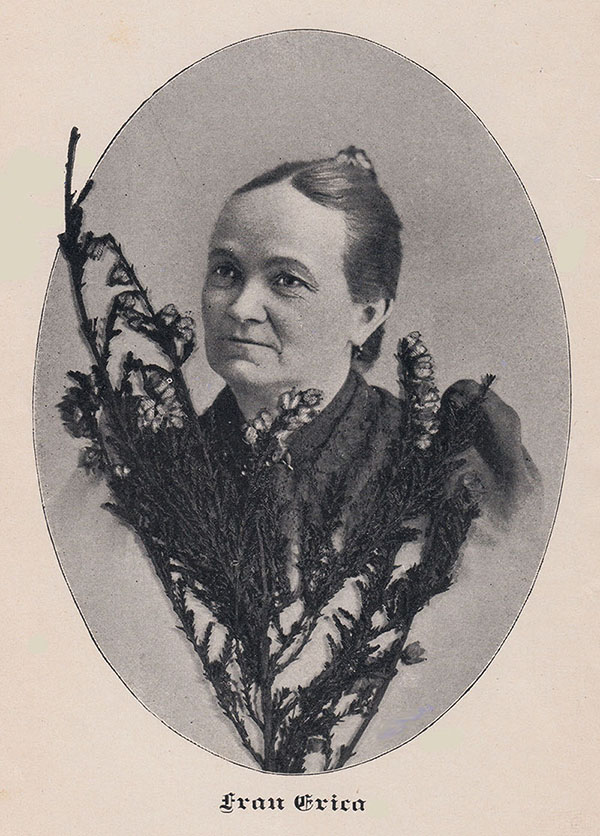|
Wilhelm and Frau Erica:
Staying the Course, Righting the Ship
II. Careers in Chicago
With their early years on the Mueller Farm behind them, Wilhelm and Adelheid began to look toward the next chapter. Wilhelm’s work as a drayman in Kendallville was a temporary measure. In less than two years they were off to Chicago, where Adelheid would continue her career as a writer under the pen name Frau Erica and Wilhelm would begin more than three decades of service as superintendent of Concordia Cemetery.
 The Joy of Kuchen Adelheid Rickmeyer Mueller, known to German readers throughout the Midwest as Frau Erica, wrote newspaper columns on cooking and housekeeping, gave advice on life’s problems, and served up devotional verse. She also wrote a cookbook for immigrant women who were unfamiliar with American ingredients, techniques and tastes. While they were still on the farm, the Muellers’ neighbor lady, Mrs. Ahrens, a good friend of Adelheid’s, lay dying. On her death bed, the woman elicited a promise that Wilhelm and Adelheid would look after her teen-age daughter, Caroline Ahrens.
“Tante Caroline” (pronounced in the German way: kah-roh-LEEN-uh) came to live with them in town as their ward and proved to be a masterful housekeeper, legendary baker and stunningly good cook, having picked up many of these skills directly from Adelheid. With Tante Caroline keeping the household humming, Adelheid began to devote considerable time to her literary career under the pen name Frau Erica. Under that byline, Adelheid wrote the famous Deutsch-Amerikanisches Kochbuch, a work designed to help German immigrants who were new to American ingredients, measures and methods. She also wrote devotional pieces, principles for Lutheran living, and household advice columns for German periodicals. Her syndicators included die Rundschau, a newspaper published in Milwaukee, and die Abendschule, a bi-weekly magazine published by Louis Lange in St. Louis. She also used the question-and-answer advice column format that would later be popularized by Ann Landers and Dear Abby.
Frieda Mueller, daughter of Frau Erica’s son Ernst, believed that Tante Caroline was the enabling force behind the cookbook — not only because she relieved Adelheid of the household chores but also because she became a superior source of information. The Muellers agreed that Tante Caroline’s bread was consistently better than Frau Erica’s own loaf, so much so that Tante Caroline took over all the bread baking. On baking day, the bread was her sole concern. Frieda actually tasted the product as a teenager in 1917 when she visited her grandparents in Forest Park, Illinois.
 Wilhelm Mueller, superintendent In 1887, Wilhelm Mueller began what would turn out to be his final job: 31 years of service as superintendent of Concordia Cemetery in Forest Park, Illinois. There is some variance in oral history about how deeply Frau Erica was committed to actual household work. Some of her grandchildren suggested that she was a bit on the lazy side, taking a literary interest in domesticity but leaving the physical labor to Tante Carolina and her own children. There are several mentions in the archives of the “twelve buckets of hot water” that Frau Erica supposedly hauled into the farmhouse in order to scrub the wooden floors. The repetition of that single detail makes the story sound almost apocryphal, as if intended to impress the following generations.
There was a parting of the ways, at least to a degree. As she grew older, Tante Caroline began to take things from the Mueller household — small items that would usually turn up hidden in her room. At some point, probably between 1914 and 1917 long after they had left Kendallville, the Muellers asked Tante Caroline to move out, which she did. But she continued her work faithfully, coming to the home as a day laborer. She actually outlived Frau Erica by several years and now lies buried in Concordia Cemetery, Forest Park, Illinois.

Wilhelm also had a brief literary career. After a year or so as a drayman in Kendallville, he received an offer to become an editor at a German newspaper in Chicago. It looked like a profitable venture, so he moved his household to Forest Park, Illinois (known then as “Harlem”), possibly early in 1887. Within a year, however, Wilhelm had a falling-out with the newspaper over advertising policy. He protested what he considered to be lewd and lascivious advertisements which were published over his moral objections, most likely ads for women’s corsets and undergarments, not unusual at the time. He stunned everyone — not the least Frau Erica — by coming home one night and announcing that he had resigned. But something turned up. The Board of Directors of Concordia Cemetery was looking for a full-time superintendent, and a friend had suggested they consider Wilhelm Mueller. The board elected Wilhelm, and he became superintendent in 1887, holding that position until his death in 1918.
Next: Muellers in America
|

